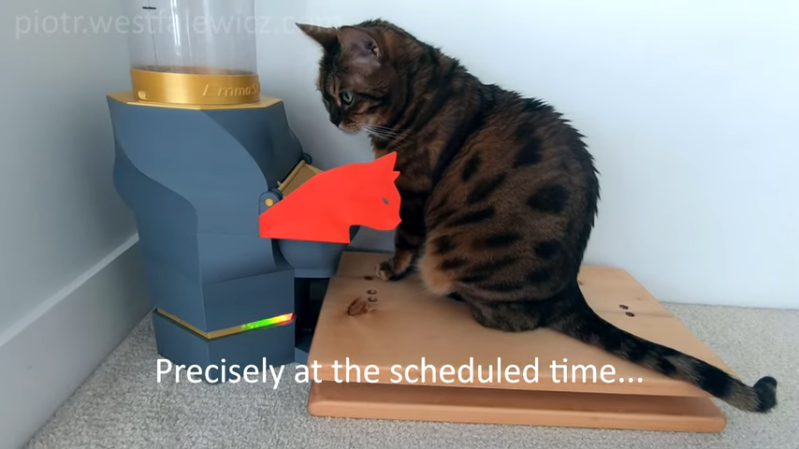If there’s one thing any cat will work for, it’s food. Usually, this just consists of meowing and/or standing on your chest until you give up the goods. [DynamicallyInvokable] has a beautiful cat, Emma, who meows loudly for food at obscene hours of the morning. As she ages, it’s getting harder and more important to control her weight. Clearly, it was time to build the ultimate automatic cat feeder—one that allows him to get lazy while at the same time getting smart about Emma’s weight.
After a year and a half of work, the feeder is complete. Not only does it deliver the goods several times a day, it sends a heap of data to the cloud about Emma’s eating habits. There’s a scale built into the platform, and another in the food bowl. Together, they provide metrics galore that get automatically uploaded to AWS. Everything is controlled with an ESP32 Arduino, including a rainbow of WS2812s that chases its tail around the base of the feeder. The faster it goes, the closer it is to feeding time.
The best part about this unique feeder is that nearly every piece is 3D printed, including the gears. Be sure to check out the build gallery, where you can watch it come together piece by piece. Oh, and claw your way past the break to see Emma get fed.
Emma doesn’t have to worry about sharing her food. If she did, maybe [DynamicallyInvokable] could use facial recognition to meet the needs of multiple cats.
















Now to add a scale to the litter box as well… (Seriously, though, you could then develop a fairly accurate idea of what was “in flight” in the food–>poop pipeline at any gi sn time).
Not that most people want to think too closely about that continuum and its icky middle stages (somehow those middle stages manage to be ickier than the end stage).
Now that’s a great way to keep your cat healthy!
The real trick would be to feed my four cats, and feed them differing amounts based identity. Some get more than others.
collars with RFID tags, if they are not already chipped.
Place the food such that access is restricted to a single animal at a time and you can get a log.
Four bowls with automatic covers tied to the particular RFID, and you get control.
Restrict the access to a single animal at a time? You don’t know my cats. They would become very creative about that when they have time. They were eating out of the same bowl when they were kittens. I just gave them two bowls to reduce the amount of food which was distributed around the bowl.
So I don’t see a chance to really control individual feeding.
Just have the bowl at the end of a corridor that fits “one cat”. When a second or wrong cat is detected inside the corridor area food should be locked away. Each cat a different feeder. They will quickly learn: that’s my feeder and it is no use trying to get the other feeder to give me food.
The evil cat will simply eat on the sly and then hang around an unfavored rival the rest of the time. The other cat won’t realize the connection as it slowly starves to death. Then evil cat moves on to the next unfavored rival.
1) Make a phone app for it.
2) Manufacture it in China.
3) PROFIT!
I wonder if it would be hard to design a 3D printed toilet brush with MQTT connectivity and maybe dynamically generated voice commentary. My only fear is that 3D printed whiskers would get clogged with pieces of fecal matter. Once 3D printing matures I’m sure those issues could be overpowered and no feces would spoil the day.
As the country bumpkin replied after using the toilet brush in his city friend’s apartment – paper remains paper [much funnier in German]
While I love the idea, execution, metrics, and of course Emma, I have one concern. It looks like the bowl she eats out of is smallish, and if so, she could be experiencing “whisker stress”. This is when a cat’s whiskers touch the sides of the bowl they eat from. They really want larger, shallow bowls. Look it up; I doubted it when I read about it, but then I noticed our cats showing signs when eating from smaller bowls. Other people I know have also reported it too.
Often known as “Why does my cat always pull his food out of the bowl and eat it on the floor?”
My Snowshoe has this issue. He has EXTREMELY long whiskers and hates small bowls!
Poor kitty what did you feed it to?
Great build! Needs more armour plating, though.
http://quinndunki.com/blondihacks/?p=3023
Well, it’s even on hackaday (.io, not .com): https://hackaday.io/project/166553-the-ultimate-cloud-cat-feeder